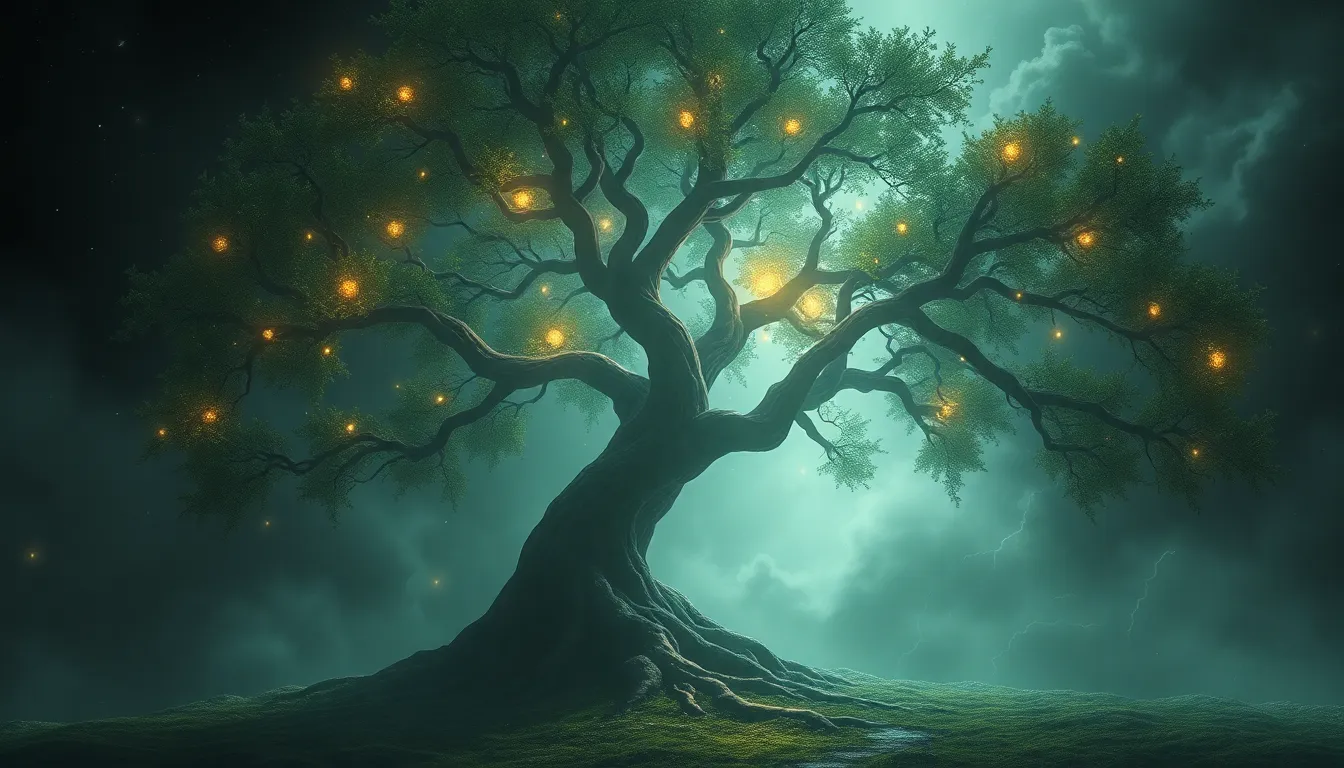The Tree of Echoes: Myths of Memory and Legacy
Introduction: The Symbolism of the Tree in Myths
The tree has been revered as a universal symbol across numerous cultures throughout history. It represents life, growth, and interconnectedness, serving as a powerful metaphor for the cycles of existence. In many mythologies, trees are sacred entities that connect the earth to the heavens, embodying the essence of memory and legacy.
The concept of the “Tree of Echoes” emerges as a profound metaphor that encapsulates how memories resonate through time, shaping our understanding of legacy. This article delves into the intricate relationships between memory and legacy as portrayed in myths and folklore worldwide.
Roots of Memory: Historical Perspectives on Memory in Mythology
Different cultures have unique perspectives on memory, often reflected in their myths. Memory serves not only as a recollection of past events but as a foundational element in establishing identity and continuity.
- The Egyptian Myth of Osiris: Osiris, the god of the afterlife, embodies the significance of memory. His resurrection symbolizes the eternal nature of memory and its role in legacies.
- The Greek Myth of Mnemosyne: As the goddess of memory, Mnemosyne’s importance is highlighted through her connection to the Muses, illustrating how memory informs creativity and culture.
- The Native American Legend of the Tree of Life: This myth emphasizes how the roots of the tree hold the memories of ancestors, connecting generations through shared history.
Branches of Legacy: The Role of Ancestry in Shaping Identity
Ancestral stories are pivotal in shaping both personal and collective identities. Myths often highlight the importance of familial connections and the legacies passed down through generations.
Consider the following mythological figures:
- King Arthur: His legacy as a leader and the ideals of chivalry are deeply tied to his lineage and the stories of his ancestors.
- Hercules: His feats and trials reflect not only his strength but also the legacy of his divine parentage, showcasing how ancestry influences character.
- Rama from the Ramayana: His journey emphasizes duty and honor, deeply rooted in his family’s values and history.
Leaves of Reflection: The Nature of Personal Memory in Myths
Personal memory, as portrayed in myths, shapes individual narratives and contributes to broader legacies. Myths often illustrate how personal experiences inform our understanding of identity and purpose.
Examples include:
- Persephone’s Abduction: This myth reflects personal trauma and the cyclical nature of life, emphasizing how personal experiences can evoke broader themes of renewal and loss.
- The Odyssey: Odysseus’ journey is a profound exploration of personal growth, memory, and the longing for home, showcasing how individual experiences contribute to legacy.
The Echoes of Time: How Myths Preserve Collective Memory
Myths serve as vessels for preserving collective memory, ensuring that societal values and historical events are transmitted across generations. They act as cultural touchstones, reminding communities of their shared history and guiding future actions.
Examples of such myths include:
- The Flood Myth: Found in various cultures, this myth serves as a reminder of humanity’s relationship with nature and the consequences of moral decay.
- The Creation Myths: These foundational stories explain the origins of the world and humanity, encapsulating cultural beliefs and values.
Intertwined Lives: The Connection Between Memory and Legacy in Folklore
Folklore acts as a crucial medium for passing down memories and legacies. Through storytelling, traditions are preserved, often evolving over time while maintaining their core messages.
Oral traditions and written myths both play significant roles in this process:
- Oral Traditions: These dynamic narratives often change with each telling, reflecting the lived experiences of the community.
- Written Myths: These tend to preserve specific versions of stories, allowing for a more static interpretation of cultural heritage.
The Tree of Echoes in Modern Context: Memory and Legacy Today
The concept of the Tree of Echoes is especially relevant in contemporary society, where memory and legacy are influenced by technology and social media. These platforms enable individuals to share their stories and legacies in unprecedented ways.
However, this also raises questions about the authenticity and permanence of memories in a digital age:
- Digital Footprints: Our online presence creates a record of memories that can persist long after we are gone, potentially shaping future legacies.
- Social Media: Platforms like Facebook and Instagram allow for the sharing of personal stories, but they also risk oversimplifying complex narratives.
Lessons from the Past: What Myths Teach Us About Memory and Legacy
Myths offer valuable lessons about the importance of memory in shaping our identities and legacies. Some key takeaways include:
- The Importance of Remembering: Myths remind us that memory is vital for understanding our past and making informed decisions for the future.
- Interconnectedness of Stories: Our personal stories are often intertwined with the wider narrative of our communities, emphasizing the collective nature of legacy.
Cultivating the Tree of Echoes: Personal Practices for Honoring Memory and Legacy
Cultivating your own “Tree of Echoes” can be a meaningful practice. Here are some practical steps to honor personal and familial legacies:
- Create a Family Tree: Document your ancestry and share stories of your relatives to preserve their memories.
- Journaling: Write down personal experiences and reflections to capture your own narratives.
- Storytelling Traditions: Engage in storytelling with family and friends to keep memories alive.
- Rituals and Ceremonies: Establish rituals that honor your family’s history and cultural heritage.
Conclusion: The Enduring Power of Myths in Shaping Our Lives
Myths hold an enduring power in our understanding of memory and legacy. They remind us of the significance of our stories and the connections we share with those who came before us. As we explore our own narratives and legacies, we can draw inspiration from the Tree of Echoes, nurturing our memories to create a lasting impact on future generations.
Let us embark on a journey of discovery, honoring the past while shaping a legacy that resonates through time.



